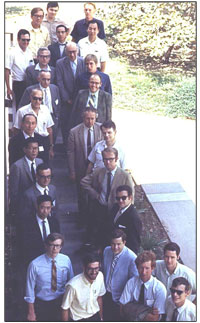The International Workshop on Water Waves and Floating Bodies is an annual meeting of engineers and scientists with a particular interest in water waves and their effects on floating and submerged bodies. In the organization and conduct of the Workshop, particular emphasis is given to the participation of younger researchers, interdisciplinary discussion between engineers and scientists, and the presentation of preliminary work before it is published elsewhere.
Since its inception, the Workshop has grown from strength to strength and annually brings together marine hydrodynamicists, naval architects, offshore and arctic engineers and other scientists and mathematicians, to discuss current research and practical problems. Attendance is restricted to the authors of submitted extended abstracts that are reviewed for acceptance by a small committee. The Proceedings of each Workshop include Introductions with background information, copies of the extended abstracts, and recorded discussions, all posted here under the page for each Workshop.
The success of the Workshops is due not only to the dedication of the participants, but also to the efforts of the host/organizers for each event and to the financial support of many government and industrial sponsors. These organizations and people are identified in each Introduction. Special sessions have been organized at some Workshops to honor individuals who have participated in the Workshops, as well as some mentors who predated the Workshops.
The IWWWFB was initiated by Professor D. V. Evans (University of Bristol) and Professor J. N. Newman (MIT) following informal meetings between their research groups in 1984. First intended to promote communications between workers in the UK and the USA, the interest and participation quickly spread to include researchers from many other countries. The first Workshops evolved from meetings of the Analytical Ship-Wave Relations Panel (H5) of the Society of Naval Architects and Marine Engineers. These were held in the United States, but frequently attended by visitors from other countries. The Introductions to IWWWFB20 (2005) and IWWWFB21 (2006) include personal anecdotes by Professors Evans and Newman regarding the historical background of the Workshops. |
 |

